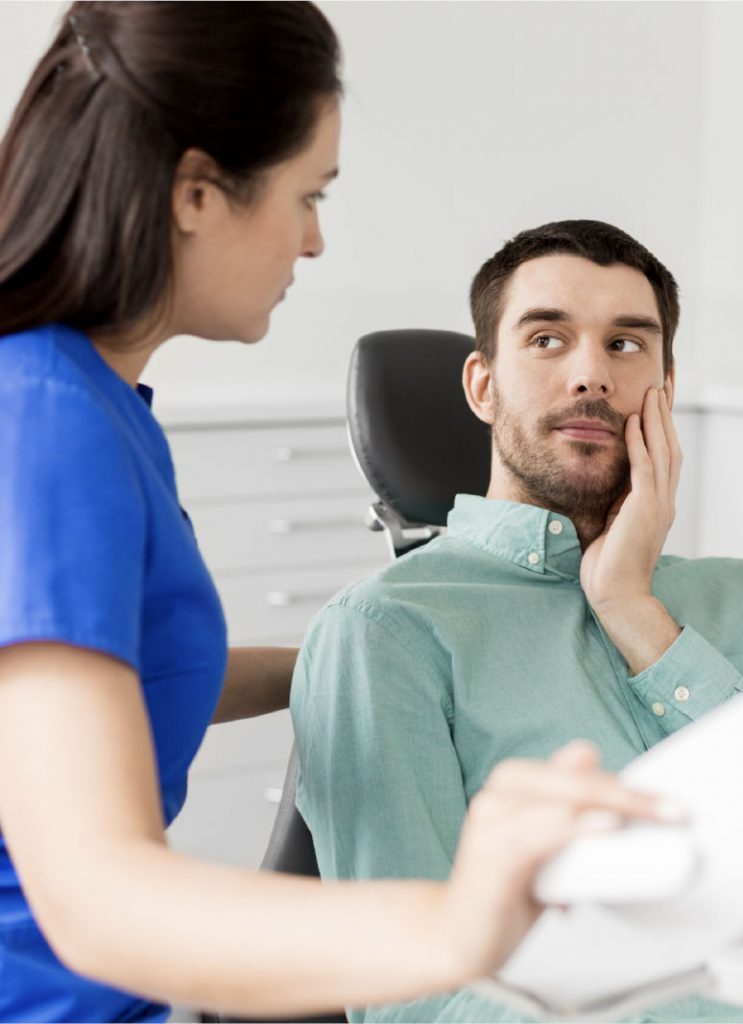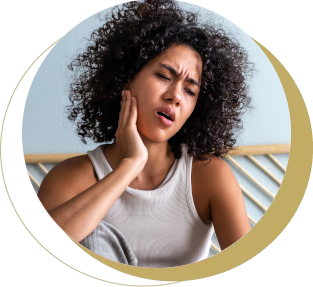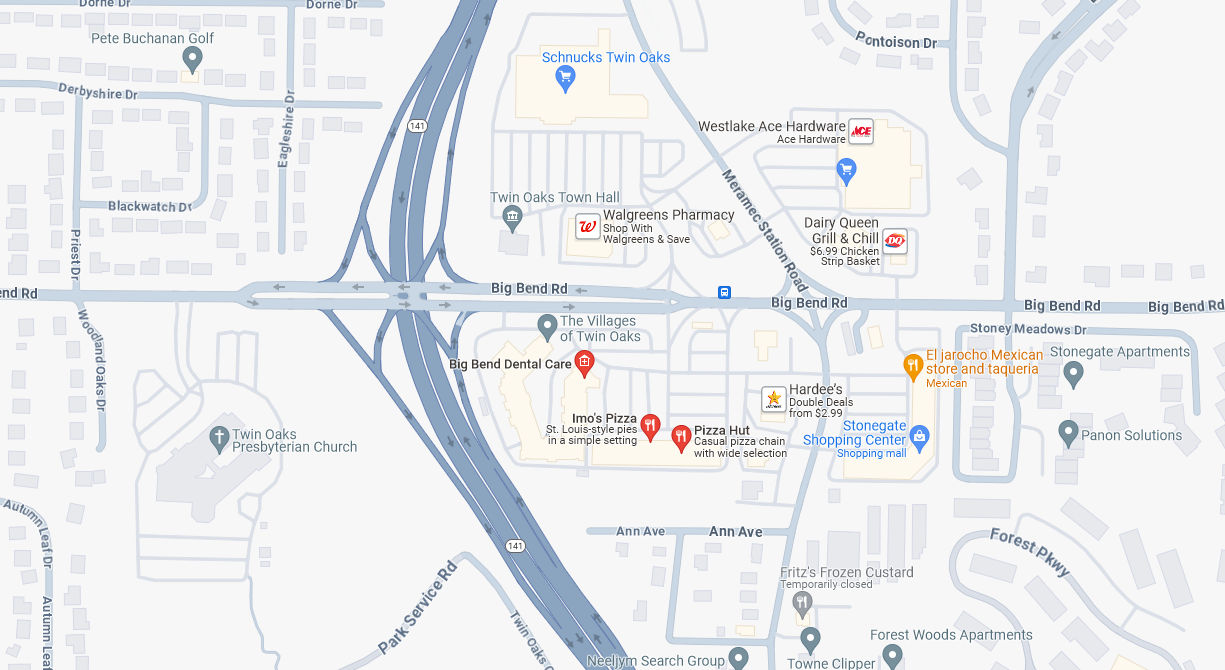“TMJ” is commonly used to describe pain in the temporomandibular joint; the joint connecting your jawbone to your skull. If it hurts to move your jaw to chew, talk, or yawn, you may have TMJ disorder or TMD. You may also hear popping or clicking noises. Frequent headaches may indicate a TMJ problem.


If you have pain in your jaw,
call us today.
Let’s discover if you’re struggling with the effects of TMJ and what we can do about it.
What Is TMJ Disorder?
TMJ disorder, also known as TMD, affects the temporomandibular joint that connects your jawbone to your skull. This joint allows your mouth to open, close, and move smoothly while eating, speaking, and yawning. When the joint or surrounding muscles become inflamed, injured, or misaligned, you may experience jaw pain, stiffness, and difficulty moving your mouth. In many cases, patients also report hearing clicking, popping, or grinding sounds during movement.
If you experience jaw discomfort, headaches, or limited jaw mobility, you may be suffering from TMJ disorder. The temporomandibular joint is supported by cartilage and cushioning tissue that help your jaw move freely. When these tissues wear down or become damaged due to arthritis, injury, stress, or teeth grinding, the joint can lose stability and function.
At Gateway Center for Sleep Apnea & TMJ Therapy in St. Louis, MO, Dr. Kevin F. Postol provides detailed TMJ evaluations and personalized treatment plans to help patients find lasting relief.
Common Symptoms of TMJ Disorder (TMD)
TMJ disorder symptoms can range from mild tension to severe, chronic pain that affects your daily life. You may experience:
- Pain or tenderness in the jaw joint, face, or near the ears
- Difficulty chewing or pain while eating
- Clicking, popping, or grating sounds when opening or closing your mouth
- Tightness or locking of the jaw
- Headaches, neck pain, and facial discomfort
While occasional popping without pain is usually harmless, persistent discomfort, restricted movement, or worsening symptoms may indicate a more serious TMJ issue. Dr. Postol can diagnose the cause and recommend appropriate treatment options to restore comfort and function.
How can we help you?

My jaw hurts constantly

My jaw hurts when I eat

I have popping and clicking

I can’t open my mouth all the way
Constant Jaw Pain and Muscle Tension
If your jaw hurts constantly or feels tense, the temporomandibular joint or surrounding muscles may be overworked or inflamed. Because you use your jaw muscles for eating, speaking, and even facial expressions, constant pain can interfere with normal activities.
TMJ pain often radiates into the neck, shoulders, and head, leading to frequent headaches or nerve pain. Chronic cases can affect posture and sleep quality. Dr. Postol specializes in identifying the root causes of TMJ pain, such as muscle imbalance, clenching, or structural misalignment, and provides comprehensive treatment to relieve strain and restore proper function.
Jaw Pain When Eating or Chewing
Pain while chewing is a common sign of TMJ dysfunction. When you eat, the temporomandibular joint endures pressure and movement that can worsen inflammation or joint misalignment. If your bite is uneven or your teeth do not align correctly, your jaw must work harder to break down food, causing additional tension.
An improper bite can also contribute to chronic fatigue in the jaw muscles, leading to soreness and discomfort. Dr. Postol can evaluate your bite alignment and TMJ function using advanced diagnostic tools to determine whether the problem is related to muscle fatigue, cartilage wear, or a structural imbalance.
Popping and Clicking in the Jaw
Hearing or feeling a pop or click in your jaw joint is one of the most common signs of TMJ disorder. The joint contains a small disc that cushions the jawbone and helps it move smoothly. When this disc slips out of position, you may hear a clicking or popping sound as it moves back into place.
While not all jaw popping is painful, repeated or painful clicking may signal a misaligned joint or a disc that is wearing down. Over time, this can lead to restricted movement or chronic inflammation. Dr. Postol can assess the condition of your joint and recommend preventive or corrective treatments to avoid long-term damage.
Difficulty Opening the Mouth
Some patients with TMJ disorder notice that their jaw feels tight or will not open fully. In advanced cases, the jaw may even lock in place. This limitation often results from inflammation, joint damage, or trauma. Swelling or infection can also contribute to the problem, making simple activities like eating or speaking difficult.
If you are unable to open your mouth comfortably or experience pain when trying to do so, it is important to seek professional evaluation. Dr. Postol can diagnose the cause of restricted movement and recommend therapies to restore mobility and comfort.






What a great experience! EVERY ONE was so friendly and kind. It’s so wonderful that Dr. Postol takes real one on one time for each patient. It makes you feel comfortable and heard. I appreciated that so much!
Sasha R.

Causes of TMJ Disorder

TMJ disorders can have several causes, and many patients experience symptoms due to a combination of factors. Common causes include:
- Arthritis or cartilage deterioration
- Trauma or injury to the jaw
- Misaligned bite or dental issues
- Chronic teeth grinding or clenching
- Muscle tension from stress
- Genetic predisposition or connective tissue disease
The temporomandibular joint functions as both a hinge and a sliding joint, cushioned by cartilage and a small disc. When this cushioning wears away or shifts out of place, friction and inflammation can develop. This leads to discomfort, reduced jaw mobility, and in severe cases, joint damage.
In some cases, the exact cause of TMJ disorder is difficult to pinpoint because symptoms may overlap among different conditions. Dr. Postol uses a comprehensive diagnostic process, including physical examinations, imaging, and bite analysis, to identify the underlying cause and design a personalized treatment plan.
TMJ Disorder Treatment in St. Louis, MO
Living with TMJ pain can make everyday life challenging. It can interfere with eating, speaking, and sleeping, and may even affect your overall well-being. At Gateway Center for Sleep Apnea & TMJ Therapy, Dr. Kevin F. Postol provides compassionate care focused on restoring comfort and function.
Treatment for TMJ disorder depends on the cause and severity of your symptoms. Common treatment options may include oral appliances, bite adjustments, physical therapy, stress management, or lifestyle changes. Dr. Postol tailors each plan to meet the unique needs of his patients, helping reduce pain and prevent future joint damage.
You do not have to live with jaw pain, popping, or restricted movement. Contact our St. Louis office today to schedule a TMJ consultation with Dr. Postol and take the first step toward lasting relief and improved jaw health.
Are you tired
of being tired?
Download the first chapter for free
or get your copy of the book today!


Call or Text!

1338 Big Bend Road
Twin Oaks, MO 63021



